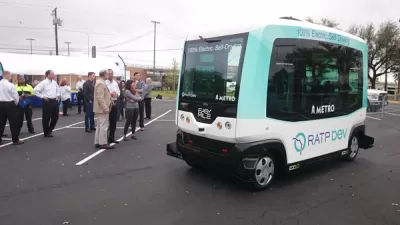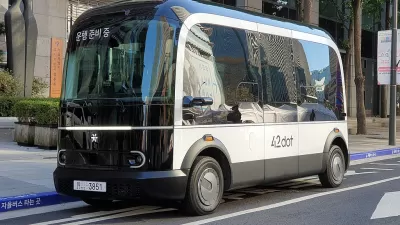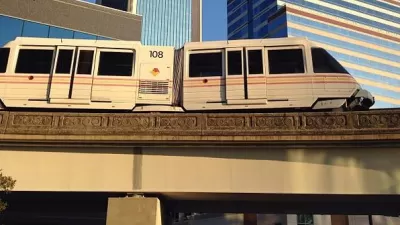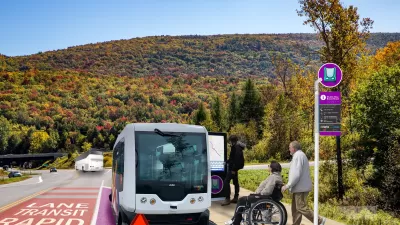There is no shortage of autonomous shuttle services operating around the United States, which means there are plenty of lessons to be learned.

Chris Teale surveys the landscape of automated shuttle pilots around the United States and finds a significant number of case studies to choose from.
"Cities including Detroit, Denver, Columbus, OH and Las Vegas have already piloted autonomous shuttle buses, which typically carry 10 people or less on a fixed route through a section of their downtowns," according to Teale.
"Meanwhile, the likes of Providence, RI, Orlando, FL and New York City are set to launch their own service in the coming months, with companies like May Mobility and Optimus Ride among the partners to provide the shuttle technology."
According to Teale, the adoption of autonomous shuttles is widespread enough to start evaluating for lessons on the impact of the services on public transit, the broader urban transportation system, and public perception of autonomous vehicles.
Teale also notes that many autonomous shuttle programs have encountered challenges. "Las Vegas’ pilot program garnered some negative publicity after a minor accident when a delivery truck backed into one of its shuttles," for instance, and "Denver struggled with one of those winter storms just a few months after its Regional Transportation District (RTD) transit agency and its partners launched the shuttle near a commuter rail station and a new development."
Teale also visits the example of Ann Arbor, where autonomous shuttles operates on campus at the University of Michigan. The university already released a report on how to launch a driverless shuttle with lessons specifically about the city's streets and transportation system.
FULL STORY: How autonomous shuttles are changing city transportation

Maui's Vacation Rental Debate Turns Ugly
Verbal attacks, misinformation campaigns and fistfights plague a high-stakes debate to convert thousands of vacation rentals into long-term housing.

Planetizen Federal Action Tracker
A weekly monitor of how Trump’s orders and actions are impacting planners and planning in America.

Chicago’s Ghost Rails
Just beneath the surface of the modern city lie the remnants of its expansive early 20th-century streetcar system.

Bend, Oregon Zoning Reforms Prioritize Small-Scale Housing
The city altered its zoning code to allow multi-family housing and eliminated parking mandates citywide.

Amtrak Cutting Jobs, Funding to High-Speed Rail
The agency plans to cut 10 percent of its workforce and has confirmed it will not fund new high-speed rail projects.

LA Denies Basic Services to Unhoused Residents
The city has repeatedly failed to respond to requests for trash pickup at encampment sites, and eliminated a program that provided mobile showers and toilets.
Urban Design for Planners 1: Software Tools
This six-course series explores essential urban design concepts using open source software and equips planners with the tools they need to participate fully in the urban design process.
Planning for Universal Design
Learn the tools for implementing Universal Design in planning regulations.
planning NEXT
Appalachian Highlands Housing Partners
Mpact (founded as Rail~Volution)
City of Camden Redevelopment Agency
City of Astoria
City of Portland
City of Laramie





























